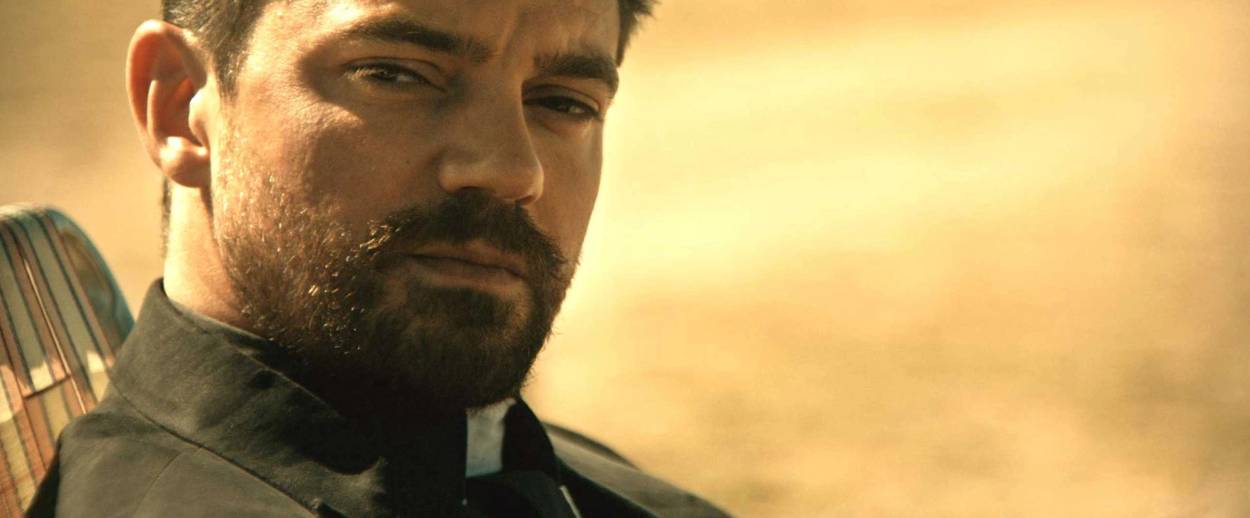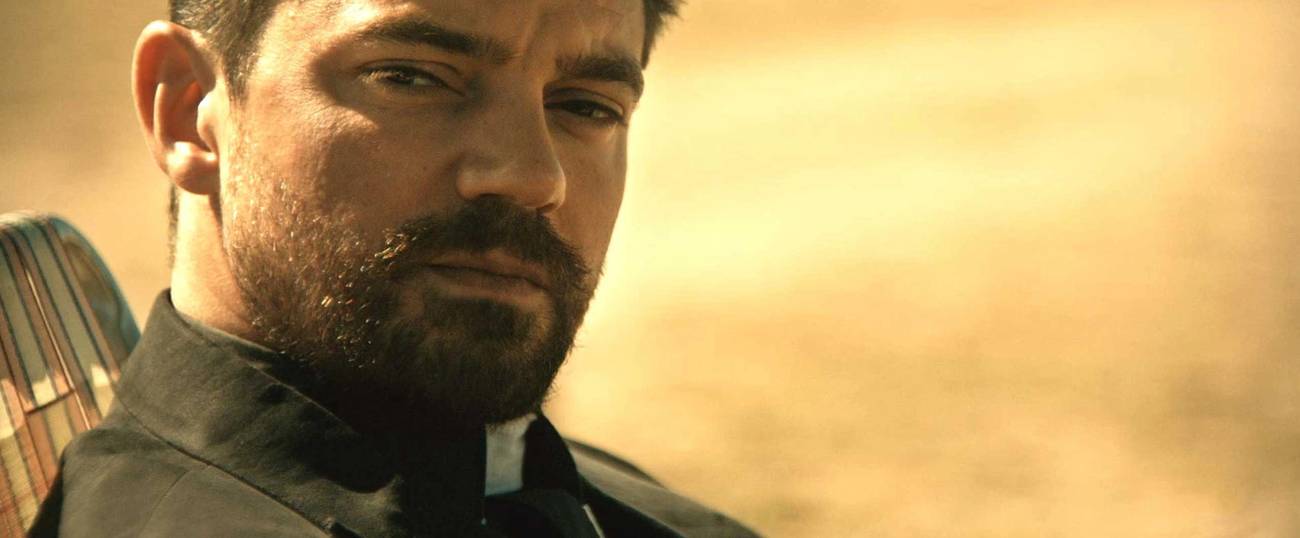Seth Rogen’s New TV Show Is Violent, Fun, and Theologically Profound
Never mind the Christian imagery: ‘Preacher’ is a show Abraham Joshua Heschel would’ve loved




Attention parents, teachers, rabbis, and anyone else entrusted with cultivating the spiritual and moral development of the young: Take away your children’s books, ban all homework for a while, sit them down in front of the TV, and make them watch Preacher.
Sure, the show, which premiered this week, features spontaneous combustions, impalings on a plane, a ballet of stabbings, a homemade bazooka, and a character accurately named Arseface—and that’s just the first 30 minutes of the very first episode. But it also manages the very difficult feat of being simultaneously the most outrageously fun and the most theologically serious show on television, and the pleasures of contemplating the machinations of free will while gawking at a character holding up a gooey bit of flesh, say, and wondering whether it’s a slice of shawarma or a severed ear are too great to resist.
Based on the popular comic book series of the same name, the show—created by Seth Rogen, Evan Goldberg, and Sam Catlin for AMC—tells the story of Jesse Custer, a preacher’s son who disavows his checkered past to enter the family business and take over the old man’s rural Texas congregation. It’s a white clapboard establishment, just at the end of a dirt road, where sermons are followed by rituals like shooting some squirrel and beating up on the high-school football team’s new mascot for being too politically correct. Custer is on the cusp of abandoning it and settling back into a life of crime. He enters the church alone at night, cigarette dangling from his lips, and asks the Creator for some answers. The Lord never materializes, but a creature named Genesis does: the spawn of an angel and a demon’s night of passion, the supernatural being—the literal embodiment of good and evil—possesses Custer’s body, making him the mightiest force in the universe. Aided by a band of merry degenerates, including the crafty assassin Tulip O’Hare and the drunken Irish vampire Cassidy, Custer goes on a spiritual quest, a man in search of God.
Or is he a god in search of man? Custer is too busy to do much reading, but if he did he might’ve dug Abraham Joshua Heschel. Describing a world Custer would immediately recognize, Heschel lamented the fact that, too often these days, “faith is completely replaced by creed, worship by discipline, love by habit; when the crisis of today is ignored because of the splendor of the past; when faith becomes an heirloom rather than a living fountain; when religion speaks only in the name of authority rather than with the voice of compassion—its message becomes meaningless.”
The preacher is here to fix all that, and his approach is one Heschel would’ve applauded, give or take a few broken bones. Realizing early on that sermons and strictures make for a very poor engine with which to move hearts and minds, Custer, like Heschel, learns the power of radical amazement, the art of waking up in the morning and taking nothing for granted. Sure, amazement’s easier to come by when your best bud is an undead dude who can suck in an entire cow with one slurp, but Custer’s real strength lies not in his facility with the fantastic but in his tremendous capacity for that greatest of ordinary human superpowers: empathy. Early on, before he becomes possessed, he risks his reputation and his backside standing up to a wife-beating redneck. Once endowed with the might of the heavens, he continues on the same path; having surpassed himself and evolved, however mystically, past his doubts and self-loathing, he wants his fellow human beings to believe that they can do the same. Even though he has the power to compel mortals to obey his commands, Custer rarely uses it, and when he does it only works when the listener is ready in his or her heart to really comprehend the good word. (The pilot episode, which ends on a gruesome if hilariously poignant note, underscores this point.) Rather than redeem his flock, he chooses to lead by example, to light the way, to seek God’s love and give love in return.
That, to Heschel, was an important tenet of the religious experience, and in portraying it so vividly Preacher, for all of its Christian imagery and storylines, is also, in many nontrivial ways, a deeply Jewish show. “The grand premise of religion,” Heschel wrote, “is that man is able to surpass himself; that man who is part of this world may enter into a relationship with Him who is greater than the world; that man may lift up his mind and be attached to the absolute; that man who is conditioned by a multiplicity of factors is capable of living with demands that are unconditioned. How does one rise above the horizon of the mind? How does one free oneself from the perspectives of ego, group, earth, and age? How does one find a way in this world that would lead to an awareness of Him who is beyond this world?” You can almost imagine that these are the questions Preacher’s creators presented when pitching their show to the network.
Much credit, then, to Seth Rogen. Too frequently dismissed as not much more than an affable stoner, he is quickly becoming one of our more emotionally generous filmmakers and one who grapples with faith not as symbol or theory or abstraction but as experience, which, really, is the only path to meaning, to transcendence, to awe. Rogen wrestled with this theme in his excellent 2015 movie The Night Before, a meditation on loss and guilt and communion masquerading as a gross-out buddy comedy, and he’s doing it again in Preacher, a theological tract underscoring its weighty questions with a liberal dose of ass-kicking.
Which, really, is what religion ought to do. Custer is the rabbi we all wish we had, and not only because he’s a supreme being who is also ridiculously good-looking and a really handy with a gun. He’s the preacher who understands that it’s not enough to be told what to do, that you have to feel it in your heart and that to feel it in your heart you need to be surrounded by people who love you and accept you even if you’ve done very regrettable things. He’s the man of God who knows that it’s not enough to follow halakha, or the law; you also have to follow aggadah, the essence of our spiritual thriving, the reason we want to believe. Few of us are blessed with such a shepherd in shul, but all of us ought to be grateful we can find these sparks of the divine in Preacher.
***
Like this article? Sign up for our Daily Digest to get Tablet Magazine’s new content in your inbox each morning.
Liel Leibovitz is editor-at-large for Tablet Magazine and a host of its weekly culture podcast Unorthodox and daily Talmud podcast Take One. He is the editor of Zionism: The Tablet Guide.